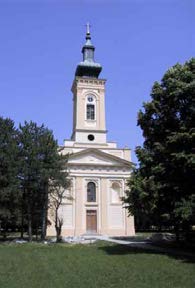Sakule is a settlement in Serbia in the municipality of Opovo in the South Banat District. According to the 2011 census there were 1,847 inhabitants. Sakule was mentioned already in 1432. In the Pre-Trial period they fell under the Kovin County. The paturists of the Pec Patriarchate Monastery stopped by collecting attachments in 1660 and in Sakule. Year 1716/18. By 1742, the village was under the so-called Neuzin process, and since that year, when the processes were interrupted, the Neuzine neighborhood was added to the Great-Byzantino district, directly under Pančevo, in which the district remained until 1773, when they were included in the 12th German- banat regiment. In the 18th century, the village was part of the Timisoara Diocese within the framework of the Pancevo protopia.
There is little information about the life and property of the Sakul residents, but it is certain that the village lived from cattle breeding and farming, and partly from fishing. Other activities were slightly represented, apart from, of course, domestic work.

Before the abolition of the Military Border, Sakule predominated in the cultural and national sense. Soon after the founding of the Serbian National Theater in Novi Sad, since 1862 there has been a “Voluntary Theater Society” in Sakulama, which held several performances every season, with the aim of helping Novosadians from the income. In 1862, this “Volunteer Society Sakulsko” earned and sent colleagues to the Novi Sad Annex 20 f. In 1867, the village got its own reading room, which was founded by the devoted Serbs, and next in 1868, the Singing Family. In 1862, the Serbian book was bought by Paro Petar Kupusarevic, teacher Andrija Petkovic and other readers. Paroch of Sakul Aleksandar Ćurčić launched in May 1895 his “Branislav Orthodoxy”, an Orthodox theologian who fought against the Nazarene sect in the village and its surroundings.
The most famous manifestation in Sakul is Ovčarski dani. This event is held every year in March and on that occasion cattle breeders gather together (cattle, sheep, donkeys, etc.), prepare and taste specialties from local banana cuisine, exhibit handicrafts and maintain a particularly attractive and already well-known race on asses in several categories , according to which the Ovčarski Dani are in the first place recognizable. All these events are accompanied by a rich cultural and artistic program and a visit by distinguished personalities from the world of culture and public life.
The population of Sakule is 1641 adult, and the average age of the population is 41.9 years (40.6 for men and 43.2 for women). The village has 681 households, and the average number of members per household is 3.01.
